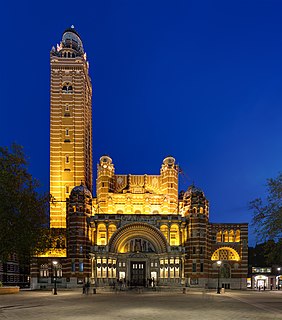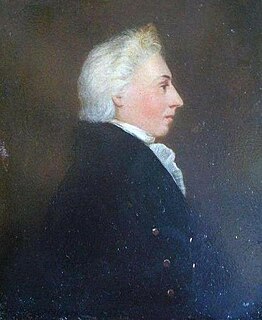
Recusancy, from the Latin recusare, was the state of those who refused to attend Anglican services during the history of England, Wales and Ireland. The term was first used to refer to people, known as recusants, who remained loyal to the pope and the Roman Catholic Church and did not attend Church of England services.

Richard Challoner (1691–1781) was an English Roman Catholic bishop, a leading figure of English Catholicism during the greater part of the 18th century. The titular Bishop of Doberus, he is perhaps most famous for his revision of the Douay–Rheims translation of the Bible.

Saint Edmund Arrowsmith, SJ, is one of the Forty Martyrs of England and Wales of the Catholic Church. The main source of information on St Edmund is a contemporary account written by an eyewitness and published a short time after his death. This document, conforming to the ancient style of the "Acts of martyrs" includes the story of the execution of another 17th-century Recusant martyr, Richard Herst.
Blessed George Nichols was an English Catholic martyr.

The Catholic Church in England and Wales is part of the worldwide Catholic Church in full communion with the pope. It traces its history to the apostles through Catholic Christendom, the Western Latin Church, particularized and recorded in Roman Britain as far back as the 1st century. Later, in the 6th century, the church was judicially bonded to the Apostolic See of Rome, when Pope Gregory I through his Benedictine and Roman missionary, Augustine of Canterbury, established a direct link from the Kingdom of Kent to the Holy See in 597 AD. This ancient link to which Irenaeus says "every church" should "resort" on account of its "preeminent authority," has enriched the inter-church identity of the English Catholic Church, not only across Britain and continental Europe but also and especially globally within what is sometimes referred to as the "Catholic Communion of Churches".
Blessed George Gervase was an English Benedictine priest who worked as a missionary in England during the period of recusancy. He was martyred at Tyburn.

George Leo Haydock (1774–1849), scion of an ancient English Catholic Recusant family, was a priest, pastor and Bible scholar. His edition of the Douay Bible with extended commentary, originally published in 1811, became the most popular English Catholic Bible of the 19th century on both sides of the Atlantic. It remains in print and is still regarded for its apologetic value.

Ugthorpe is a village and civil parish in the Scarborough borough, situated near Whitby, North Yorkshire, England. According to the 2011 UK census, Ugthorpe parish had a population of 225, an increase on the 2001 UK census figure of 201.
Thomas Haydock (1772–1859), born of one of the oldest English Catholic Recusant families, was a schoolmaster and publisher. His dedication to making religious books available to fellow Catholics suffering under the English Penal Laws came at great personal cost. He is best remembered for publishing an edition of the Douay Bible with extended commentary, compiled chiefly by his brother George Leo Haydock. Originally published in 1811 and still in print, it is one of the most enduring contributions to Catholic biblical studies.
A priest hunter was a person who, acting on behalf of the English and later British government, spied on or captured Catholic priests during Penal Times.

The Eighty-five Martyrs of England and Wales, also known as George Hatdock and Forty-one Companion Martyrs, are a group of men who were executed on charges of treason and related offences in the Kingdom of England between 1584 and 1679. Of the eighty-five, seventy-five were executed under Jesuits, etc. Act 1584.
Robert Nutter was an English Catholic priest, Dominican friar and martyr. He was beatified in 1987.
George Haydock was an English Roman Catholic priest. He is a Catholic martyr, beatified in 1987. He is not to be confused with his relative, also a priest, George Leo Haydock (1774–1849).
James Fenn was an English Roman Catholic priest and martyr who was beatified on 15 December 1929, by Pope Pius XI. He was the brother of the Roman Catholic priest and writer John Fenn and also had another brother named Robert Fenn. All three brothers were choristers and scholars. Before becoming a priest at around the age of 40, Fenn married and fathered a son and daughter and became a widower. He was executed for his loyalty to the Roman Catholic faith, which was contrary to the demand to recognize supremacy of the Church of England in preference to the Church of Rome.
Joseph Gillow was an English Roman Catholic antiquary, historian and bio-bibliographer, "the Plutarch of the English Catholics".
Events from the year 1591 in Ireland.
Tresham is an English surname of Norman origins. The Treshams originally lived in Northampton. Near Northampton, is the village of Tresham, Gloucestershire.
James Haydock (1764?–1809) was a Catholic recusant priest who served during the waning years of the Penal Period in England and died a martyr to charity while attending the sick of his congregation during an epidemic.
Margaret Haydock was a Roman Catholic nun and teacher, whose life exemplified the plight of English Catholic nuns in exile on the Continent during the French Revolution.
Cuthbert Haydock (1684-1763), one of a long line of priests from the prominent Catholic recusant Haydock family, helped to keep his faith alive during the long penal period in England by serving mass in secret for those who remained faithful to the Catholic Church.






